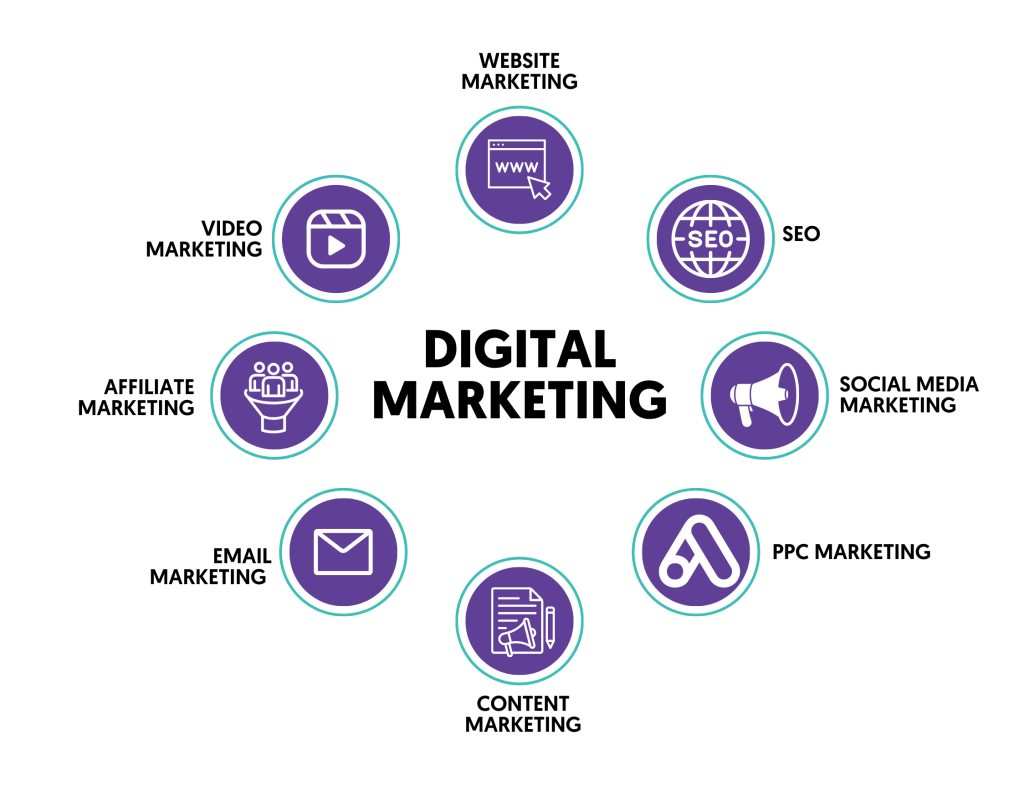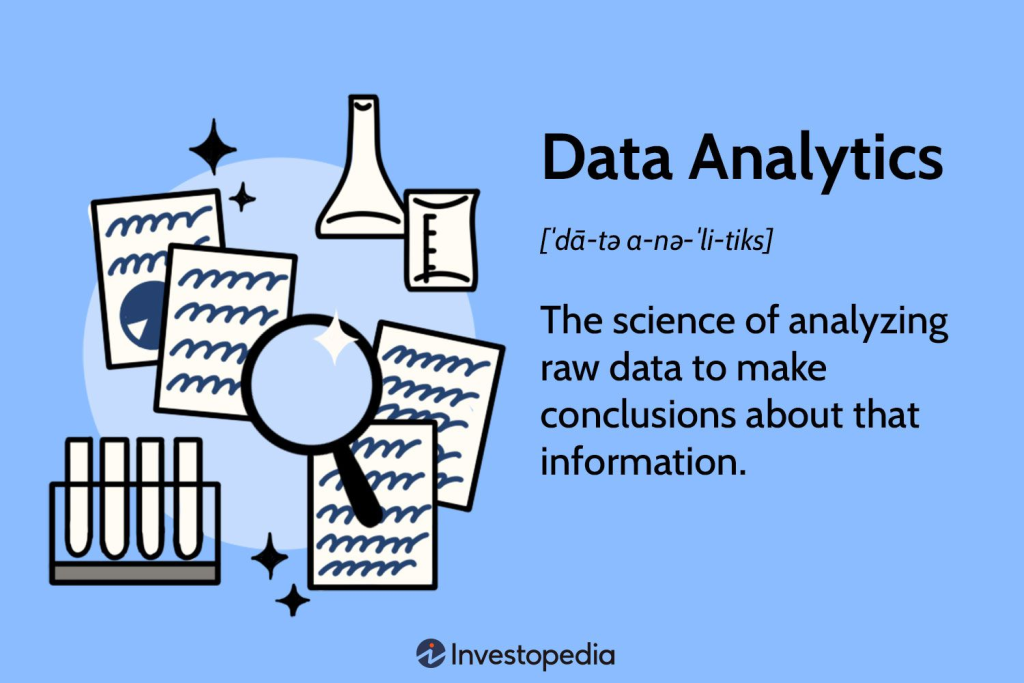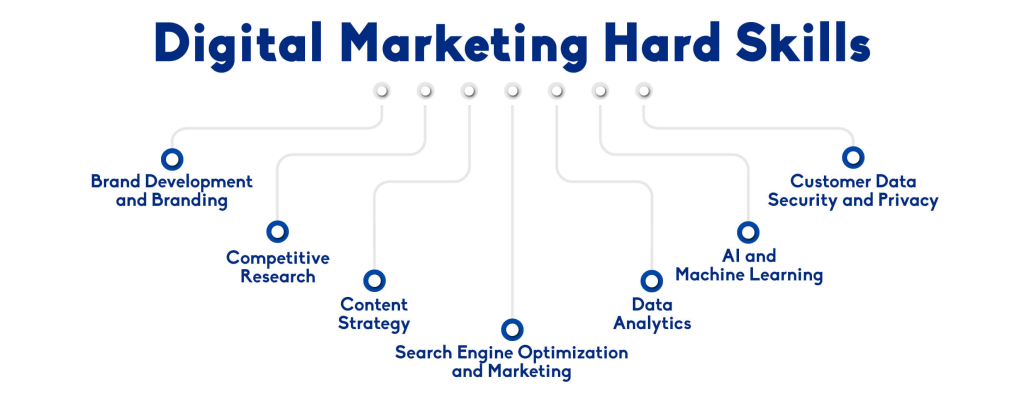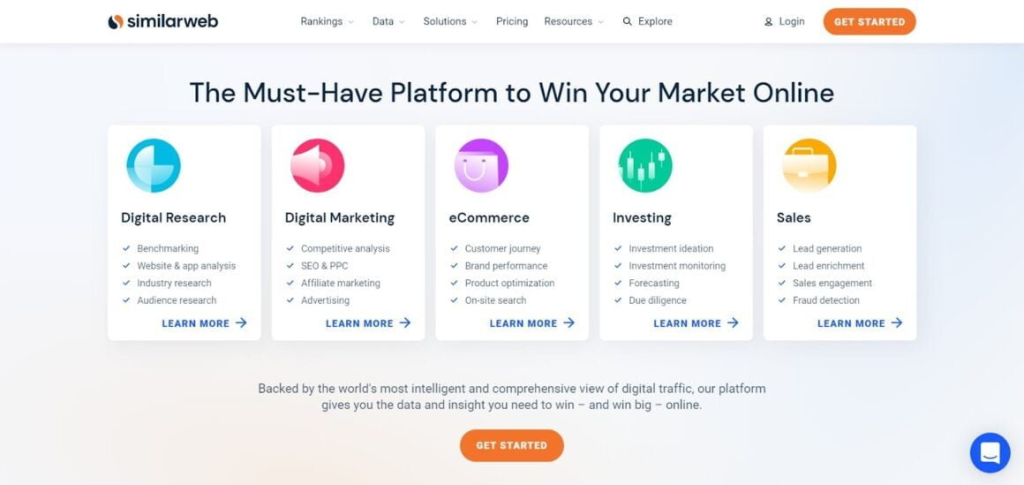Digital Marketing

Digital marketing involves the use of electronic devices to convey promotional messages and measure their impact across the customer journey. It includes online video, display ads, search engine marketing, paid social ads, and social media posts, distinguishing itself from traditional marketing methods. With the majority of people going online daily, establishing a robust online presence is crucial. Digital marketing strategies leverage channels such as social media, pay-per-click, SEO, and email marketing to connect with customers, build brand recognition, improve the customer experience, and attract new prospects.
Data Analytics

Data analytics is a process that transforms raw data into actionable insights through the use of tools, technologies, and various methods. It involves analyzing data to discover trends, solve problems, and enhance decision-making, ultimately contributing to the improvement of business processes and fostering growth.
Data analytics is used in digital marketing:-

- Customer Profiling and Segmentation
Data analytics plays a pivotal role in digital marketing by enabling the analysis of customer data for the creation of detailed customer profiles and segments. This segmentation, based on demographics, behavior, and preferences, allows marketers to customize their campaigns for specific audience segments. By delivering more relevant content and offers to targeted groups, businesses can enhance the effectiveness of their digital marketing efforts.
2. Campaign Performance Tracking
In digital marketing, data analytics is instrumental in monitoring and evaluating campaign performance. By tracking key performance indicators (KPIs) like click-through rates, conversion rates, and return on investment (ROI), marketers gain insights into the effectiveness of their campaigns. Analytics tools facilitate a deeper understanding of the performance of various channels and strategies, enabling marketers to make data-driven adjustments for optimal results.
3. Website Analytics
In digital marketing, data analytics is harnessed through tools like Google Analytics to track and analyze website performance. These tools provide insights into website traffic, user behavior, and engagement metrics. Marketers utilize data on page views, bounce rates, and user journeys to optimize website content and enhance the overall user experience, contributing to more effective digital marketing strategies.

4. Social Media Analytics
In digital marketing, data analytics is employed through social media platforms’ built-in tools, offering insights into the performance of social media campaigns. Marketers utilize these tools to track metrics such as engagement, reach, and conversions, allowing them to refine and optimize their social media strategies for greater effectiveness.
5. Email Marketing Analytics
In digital marketing, data analytics is applied to email marketing through the analysis of campaign metrics. Marketers examine key indicators such as open rates, click-through rates, and conversion rates to gauge the effectiveness of their email campaigns. Additionally, A/B testing is often employed to optimize email content and enhance overall performance based on data-driven insights.
6. Predictive Analytics
In digital marketing, data analytics plays a crucial role through predictive analytics, a method that utilizes historical data to forecast future trends and behaviors. Marketers leverage predictive analytics to anticipate customer needs, personalize content, and make informed, data-driven decisions for more effective and targeted digital marketing strategies.
7. Customer Journey Analysis
In digital marketing, data analytics is applied to customer journey analysis, which entails examining touchpoints across different channels. Marketers utilize data to map out the customer journey, pinpoint pain points, and optimize the path to conversion. This process enhances understanding of customer interactions, enabling businesses to tailor their digital marketing strategies for a more seamless and effective customer experience.
8. Attribution Modeling
In digital marketing, data analytics is integral to attribution modeling, a method that attributes conversions to specific marketing channels and touchpoints. This valuable information assists marketers in effectively allocating budget and understanding the contribution of each channel to the overall conversion process. Attribution modeling enables businesses to make informed decisions about resource allocation, optimizing their digital marketing strategies for maximum impact.
9. Real-Time Analytics
In digital marketing, data analytics is leveraged through real-time analytics, offering up-to-the-minute insights into campaign performance. Marketers use this information to make swift adjustments to campaigns based on real-time data, optimizing strategies for better and more immediate results. This capability enhances agility and responsiveness in digital marketing efforts.

10. Competitor Analysis
In digital marketing, data analytics is employed for competitor analysis, involving the examination of data related to competitors’ digital marketing efforts. This analysis enables businesses to benchmark their own performance against industry rivals and identify specific areas for improvement. By leveraging insights gained from competitors’ strategies and performance metrics, businesses can refine their own digital marketing approaches for enhanced competitiveness.